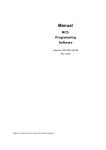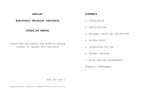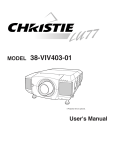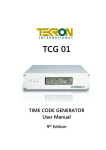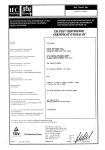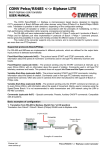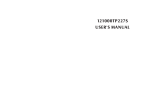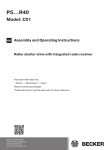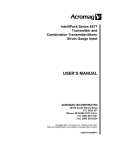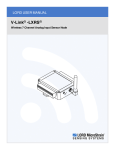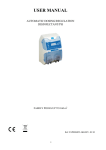Download W-10 User Manual - Intelligent Weighing Technology, Inc.
Transcript
W10 DIGITAL WEIGHING INDICATOR OPERATION MANUAL PLEASE READ THIS MANUAL VERY CAREFULLY BEFORE ATTEMPT TO OPERATE THE SCALE DECEMBER 2001 Specifications subject to change without prior notice CONTENTS 1. Introduction 2. Cautions 2.1 Warning 2.2 Power Supply 3. Specifications 4. Installation 4.1 Unpack the unit 4.2 Installation Procedures 4.3 Load Cell Connection 5. Operation Panel 5.1 Front Side Illustration 5.2 Back Side Illustration 6. Setting 6.1 Setting Basic Parameters 6.2 Setting Capacity 6.3 Calibration 6.4 Password Setup 7. Troubleshooting 7.1 Zero Calibration 7.2 Span Calibration 8. Outputs 9. Care and Maintenance 1. INTRODUCTION The W10 Weighing Indicator utilizes the latest weighing technology available and it’s equipped with free capacity program. What it means, you may now set the desire maximum capacity with the division you like (up to 1/30000). After the parameter setup completes, you will have an indicator that is tailor made just for you to suit your application. All setups are simplified and easy to follow, we hope you will soon start to enjoy it as we have. FEATURES Main features include: • Setup and calibration procedures are simplified by panel access. • Capable of connecting up to 8 x 350Ω load cells. This makes the W10 suitable for multi load cells applications. • • Equipped with weight accumulation and memory recall function. User define semi-auto zero range, zero tracking range and motion detection can be set according to application requirements. • Equipped with serial and RS-232C and parallel output port. User definable data transmission mode. • Two external display output types (RS232C or OP-05) are available for choice. • System parameters and settings are protected by password from unauthorized access. 2. CAUTIONS 2.1 WARNING Do not attempt any maintenances or troubleshooting other than those mentioned in this manual. To prevent from fire or shock hazard, do not expose the instrument to rain or any types of moisture. To avoid electrical shock, do not disassemble the unit. Please contact your local dealer for more after sale service information. 2.2 POWER SUPPLY Before plug in the power adaptor to the power outlet, check to make sure that the input voltage of power adaptor is the same as the local voltage. If not, do not plug in the adaptor and contact your dealer immediately. Recharge the indicator for 8 hours before use for the first time and recharge it when the low battery signal appears. 3. SPECIFICATIONS PERFORMANCE Display: 5 1 /2 digit LCD, 25.4 m / m height Display Resolution: up to 30,000 count, minimum of 0.1£ gV / div. Count By: 1, 2, 5, 10, 20, 50 Display Speed: 25 times/second Zero Adjustment: -2mV to 20mV Span Adjustment: 0.6mV/V to 4mV/V full scale Zero Drift: <0.3 µ V/°C (TYP) Span Drift: 8ppm/°C (TYP) Non-Linearity: <0.0033% R.O. Noise Drift: <0.05 µ V p-p (TYP) Operating Temperature: 0°C ~+40°C Operating Relative Humidity: <90% non condensing A/D CONVERTER Type: 24 bit Sigma-Delta Resolution: Up to 1,000,000 internal counts Conversion Rate: 50 times/second LOAD CELL Excitation: 5 volts for up to 8 x 350£ [ load cell Load Cell Connection: 4 Wires ¡ E ] ¡ Ï, E¡ Ð, S¡ Ï, S¡ С ^ INTERFACE RS-232C: Baud rate, transmission mode selectable Printer: Centronic type OP-05: External display POWER SUPPLY AC Adaptor: 9V/500mA Rechargeable Battery: 6V, 4Ah 4. INSTALLATION 4.1 UNPACK THE UNIT Unpacking the unit carefully. In the package you shall find: a. This operation manual x 1 b. W10 indicator x 1 c. U shape stand x 1 d. Power adaptor x 1 e. 4 pin load cell connector x 1 * Keep the packing material for future transportation purpose. 4.2 INSTALLATION PROCEDURES a. Screw the U shape stand to the indicator b. Connect the indicator with load cells (junction box). c. Turn on the indicator and let it warm up for 10 minutes before commence any setups. e. Set maximum capacity. f. Set minimum division. g. Set the decimal position. h. Set the zero tracking parameter. i. Set motion detection parameter. j. Accomplish zero calibration. k. Press ON/OFF two times to start operating 4.3 LOAD CELL CONNECTION In the package, you will find a 4-pin connector for load cell connection. Please refer to 5.2 REAR SIDE ILLUSTRATION for how to connect load cell wires. 5. OPERATION PANEL 5.1. FRONT SIDE ILLUSTRATION 1. ZERO Press this key to: (a) reset display value to zero during normal operation when the platform is empty (refer to setting to setup zero range), (b) “+” to be used as increment key during function setup. 2. TARE Press this key to: (a) subtract the weight of a container placed on the platform. The TARE indicator will appear when the system is in the tare mode, (b) “-“ to be used as decrement key during function setup. 3. NET/GROSS Press this key to: (a) switch weight displayed between gross and net weight, (b) “¡ ö ” to be used for moving the position of cursor to the left during function setup. 4. PRINT Press this key to: (a) transmit data to printer via RS-232C or parallel interface, (b) “ ¡ ÷ ” to be used for moving the position of cursor to the right during function setup. 5. M+ Press this key to: (a) accumulate current weight to memory, (b) “SET” to be used for entering setup mode when turn on the indicator. 6. MR Press this key to recall total accumulated weight result stored in memory. Accumulated data will be displayed for about 1.5 second before indicator returns to normal operation status. 7. MC Press this key to clear the accumulated data stored in memory. 8. ON/OFF Press this key to turn on and off the indicator. 9. ZERO INDICATOR This indicator will appear when the scale is at zero weight status. 10.TARE INDICATOR This indicator will appear when the tare function is in effect. 11.LOW BATTERY INDICATOR When this indicator appears, recharge the scale immediately. Failure to do so may cause unrecoverable damage to the rechargeable battery inside scale. 12.NET, GROSS WEIGHT INDICATOR This indicator indicates the weight value being displayed is at net weight or gross weight. 13.WEIGHT UNITS INDICATOR This indicator appears to indicate the weighing unit being selected. SYMBOL DISPLAYED WEIGHT UNIT t Metric ton H9 Kilogram lb Pound 9 Gram Note: when weight unit selected is “t”, no weight unit symbol will be displayed under normal operation mode. 14. IN-CHARGE INDICATOR Red color: Recharging battery Green color: Charging completed 15. MOTION INDICATOR This indicator indicates weight detected is not stable. When this indication is on, M+ and printer function is disabled. 16. MEMORY INDICATOR This indicator indicates accumulation memory contains of data. SETTING BACKLIGHT Under normal operation mode, press and hold ZERO to activate backlight function. The option will be repeated while ZERO is pressed. Release the key to obtain the desire mode. bL.oFF bL.on1 bL.on2 Disable backlight Backlight turns off at about 5 seconds after weight is stabled Backlight continuously in function bL.oFF bL.on1 REPEAT THE CYCLE bL.on2 5.2 REAR SIDE ILLUSTRATION 1. RS-232C RS232 PIN ASSIGNMENT PIN NUMBER 2 3 5 7 8 ASSIGNMENT RS232 TXD RS232 RXD GND RTS CTS 2. PARALLEL INTERFACE PRINTER INTERFACE PIN ASSIGNMENT PIN NUMBER ASSIGNMENT 1 STROBE 2 D0 3 D1 4 D2 5 D3 6 D4 7 D5 8 D6 9 D7 11 BUSY 25 GND 3. ADAPTOR JACK Plug in the adaptor to recharge the indicator for at least 8 hours before use for the first time and apply adaptor when indicator displays low battery signal. 4. LOAD CELL SIGNAL INPUT SIGNAL INPUT PIN ASSIGNMENT PIN NUMBER ASSIGNMENT 1 E+ 2 E- 3 S+ 4 S- E = Load cell excitation S = Load cell signal 5. EXTERNAL DISPLAY OUTPUT OP-05 (optional) PIN NUMBER ASSIGNMENT 1 +5V 2 DATA OUTPUT 3 DATA INPUT 4 NO SIGNAL 6. SETTING Let the indicator warm up for at least 10 minutes before commence any setups. Before use for the first time, it is necessary to set the weight unit, maximum capacity, division, decimal point position, zero tracking parameter, motion detection parameter. Utilize the keys of ZERO, TARE, GROSS/NET and PRINT during function setup to set parameters. When you press M+ for SET, the function keys will shift to perform a series of under commands e.g. ZERO for increase, TARE for decrease, NET/GROSS for move curser left and PRINT for move curser right. There are two points shall be fully paid attention to: a. Turn the power on and wait until the indicator displays “W10”, then press M+ to enter setup mode. b. Be sure to press ON/OFF twice when all settings are completed. 6.1 SETTING BASIC PARAMETERS [SET] 1-PAr. o.r. modE bt. Ut. Frmt. 0.tr. mo.d trA? mo.t Prnt SYMBOL/DEFINITION SETTINGS 0.r. (ZERO RANGE) 0 = 0% OF RATED CAPACITY 2 = 2% OF RATED CAPACITY 4 = 4% OF RATED CAPACITY 10 = 10% OF RATED CAPACITY 20 = 20% OF RATED CAPACITY 100 = 100% OF RATED CAPACITY (DEFAULT) 0.0 --0.9 --O.tr. 2.3 (AUTO ZERO TRACKING 2.4 RANGE) --9.7 9.8 9.9 trA? 0 = (ZERO TRACKING AFTER TARE) 1 = 0.1 0.2 0.3 --mo.t (MOTION DETECTION TIME 1.0 INTERVAL) --9.7 9.8 9.9 = NO TRACKING = NO TRACKING = 1.0D PER 1.5 SECONDS = 1.0D PER 2 SECONDS = 4.5D PER 3.5 SECONDS = 4.5D PER 4.0 SECONDS = 4.5D PER 4.5 SECONDS(MAXIMUM) DISABLE (DEFAULT) ENABLE = 0.1 SECOND = 0.2 SECOND = 0.3 SECOND = 1 SECOND (DEFAULT) = 9.7 SECOND = 9.8 SECOND = 9.9 SECOND (MAXIMUM) NOTE: For Auto Zero Tracking Range, the two digits stand for different meaning. O.tr.0.0- For the first digit, it means data width of zero tracking. Unit=0.5D, 0=zero tracking off O.tr.0.0- For the second digit, it means zero tracking time width. Unit=0.5S, 0=zero tracking off SYMBOL/DEFINITION SETTINGS 0.1 = 0.1 DIVISION 0.2 = 0.2 DIVISION 0.3 = 0.3 DIVISION --mo.d (MOTION DETECTION DIVISION 2.0 = 2.0 DIVISION (DEFAULT) RANGE) --9.7 = 9.7 DIVISION 9.8 = 9.8 DIVISION 9.9 = 9.9 DIVISION (MAXIMUM) 0.3 = 300 BPS 0.6 = 600 BPS 1.2 = 1200 BPS bt. 2.4 = 2400 BPS (BAUD RATE) 4.8 = 4800 BPS 9.6 = 9600 BPS (DEFAULT) 19.2 = 19200 BPS 0 = KEYPAD COMMAND TRANSMISSION PRESS PRINT TO START DATA TRANSMISSION 1 = AUTOMATIC TRANSMISSION DATA IS SENT WHEN MOTION STABLIZE modE (COMMUNICATION MODE) 2 = COMPUTER COMMAND TRANSMISSION (INITIATE DATA TRANSMISSION BY GIVING A COMPUTER READ CR LF COMMAND. READ CR LF IS DEFINED AS: R E A D CR 52H 45H 41H 44H 0DH LF 0AH 3 = STREAM TRANSMISSION CONTINUOUS TRANSMISSION (DEFAULT) SYMBOL/DEFINITION SETTINGS lb = POUND Ut. t = METRIC TONNE (WEIGHT UNIT) g = GRAM Hg = KILOGRAM 1 = 7 DATA BITS AND 1 PARITY Frmt 2 = 7 DATA BITS AND 1 PARITY (DATA TRANSMISSION FORMAT) 8 = 8 DATA BITS AND NO PARITY 9 = 8 DATA BITS AND NO PARITY 0 = PRINT KEY HAS NO FUNCTION, M+ KEY CAN PRINT. PRESS MC TO PRINT Prnt ACCUMULATED VALUE AND CLEAR IT FROM (PRINTER CONTROL) MEMORY AT THE SAME TIME. 1 = PRINT KEY HAS FUNCTION, M+ KEY DOES NOT PRINT. P.S. NO PRINTING AROUND ZERO, PRINT KEY FUNCTIONS AS SEQUENCE RESET. 6.2 SETTING CAPACITY 2-CAP FS. Ct. dP 6.2.1 Maximum Capacity a. Press M+ for SET when screen display “W10” after turn on the indicator. Press M+ again to enter the parameter setup mode 1-PAr b. Press ZERO for the next selection 2-CAP c. Press M+ to enter Maximum Capacity setup d. Set the maximum capacity by using ZERO, TARE, NET/GROSS and PRINT keys. * The Maximum Capacity is the full weight that you want your scale to handle. This could be the rated capacity of the Load Cell, or some other limit you wish to set. However, it is also limited by Mininum Display Resolution since the external resolution is only 1/30000. 6.2.2 Minimum Division a. Press M+ again to enter the setup for Minimum Division Ct. b. Change the figure shown on the display by pressing ZERO and TARE. Minimum Division can be set at 1, 2, 5, 10, 20 or 50. * * * The Minimum Division is the unit in which the display will be able to show changes in weight. It bears no relation to decimal point location. Resolution is Minimum Division divided by the Maximum Capacity, and the Minimum Display Resolution of indicator is 1/3000. Be sure that your setting combination is acceptable by it. If resolution is set greater than 1/30000. Display will read “--Erro” after setup the Minimum Division and return of the previous step to setup the Maximum Capacity. 6.2.3 Decimal Point Position a. Press M+ again to set decimal point location dP. 0. b. Change the figure shown on the display by pressing ZERO and TARE. * Press M+ again to return of main menu to continue parameter setup or press ON/OFF twice to start working. 6.3 CALIBRATION The purpose of calibration is to proof the weight shown on the display same as real one, hence an accurate weighing result can be obtained. With Zero Calibration, you can set the weighing result of an empty weighing device obtained by the indicator as your zero point. With Span Calibration, the indicator obtains another weighing result when a load is placed on the weighing device. The two weighing results will allow the indicator to adjust the linearity between these two points as straight as possible intangibly. This gives the indicator to convert the weight detected precisely and accurately calculating the weight that lies at any points in between. The closer the Span Calibration to the maximum capacity is set, the more accurate the weighing result can be achieved. In the real world, sometimes it is impossible to calibrate the weighing device at its maximum capacity weight. But by using a standard mass at the weight as close as possible to the maximum capacity possible will be adequate. The mechanism should be calibrated when you have one of the following situations; a. The system is first installed. b. Any part of the weighing device is changed. c. If any drifts is detected. * During calibration, the weighing system must be kept stable for accurate adjustment. * Use a high quality standard mass. 6.3.1 Zero Calibration 3-CAL cAL.-0 00000 Procedures: a. Press M+ to enter the setup mode when turn on W10. b. Press ZERO or TARE to select 3-CAL and press M+ to enter calibration mode. c. Display will now read cAL.-0 . Wait and confirm that there is nothing on the weighing platform and the motion detection indicator is off. d. Press M+ to perform Zero Calibration. e. Display will show “. . . .” before it completes the Zero Calibration. f. Once Zero Calibration is down, it will move to the next step and display will show “00000” for Span Calibration. g. Place the mass on the weighing device and manually key in the weight of it on the indicator, then press M+ for SET. h. Display will show “. . . .” before it completes the Span Calibration and then will return to the main menu. * If the date input is not acceptable, it will show error messages. Please refer to the troubleshooting guide for more information about error messages. 6.4 PASSWORD SETUP 1-PAr 2-CAP 3-CAL SETUP PASSWORD 4-Pin 00000 Normal Operation Status DISABLE PASSWORD 0-PAS 00000 a. Press M+ for SET when screen display “W10” after turn on the indicator. Press ZERO or TARE to select 4-Pin and press M+ to enter password setup mode b. Press ZERO, TARE, NET/GROSS and PRINT to set the password. Press M+ to confirm and it will return of normal operation mode regardless the password has been set or not. c. When password function engaged, calibration is disabled and hence the selection 3-CAL will not appear on the main menu for selection. d. To disable password function, enter the correct password first and press M+. Display will return to main menu selection. e. To cancel password function, select 4-Pin and press M+ again to re-enter the password setup. f. Press M+ to confirm the password is set to as “00000”. g. Password function is now disabled. * When password function is enabled, the main menu will only have 3 selections available to enter, 1-PAr , 2-CAP , and 0-PAS . To disable password, enter 0-PAS by pressing M+ and enter the correct password and press M+ again to disable the security function. If incorrect password is entered, display will read “--Erro” and ask to re-enter password. 7. TROUBLESHOOTING 7.1 ZERO CALIBRATION When the error messages appear on the display, the calibration is invalid. Follow theses guide step by step to solve the problems. 1. A A A A A A A a. Poor connection —To check the connector wirings. b. Wrong connection —To check the Load Cell Connector to see if the polarity of signal is reversed. c. The input offset voltage signal is too low. —To disconnect the power and insert a resistor (100–500K ohm) * Between EXC + and SIG +, a 200K ohm resistor is normally used. d. Load Cells is damaged. —To replace with new Load Cells 2. U U U U U U U * a. Poor or wrong connection —To check the connector wirings. b. The input offset voltage signal is too high. (>30mV) —The Load Cell capacity is too small or it is malfunction. Change new Load Cells with bigger capacities. c. Load Cells is damaged -To replace with new Load Cells d. Thunderstorm damage —To replace a new A/D converter If there had been inserted a resistor already, use another resistor with greater resistance. 7.2 SPAN CALIBRATION If the system is not install for the first time, and the span is still good, press MC to quit Span Calibration mode and lock all data of setting. 1. Press M+ after completed Zero Calibration, wait till the display reads “00000”. 2. Put the weight on the weighing platform and set the figure of the Span weight on the display by pressing ZERO, TARE, NET/GROSS and PRINT. 3. Press M+ for indicator to execute the command and it will display “. . . .” while processing. 4. The Span Calibration is accomplished and all of the setting data are locked. Display will exit to the next selection on the main menu. 1. L L L L L L L The input signal becomes lower. —Check the Load Cell connector to see if the polarity of signal is reversed. —The platform device has been disturbed. 2. C C C C C C C The value of span is too small. –The value of span is the Maximum Capacity. But we mentioned above, this might not be always possible. 3. - - - - - - - The output signal of Load Cell is inadequate for Span Calibration. —To decrease the Display Resolution. –To change Load Cells with higher output signal. 4. U U U U U U U a. The input signal is too high (more than 30 mV) —Replace new Load Cells with bigger capacities. b. Load Cells were damaged. –To replace with new Load Cells. c. Poor connection. —To check the connector wirings. 8. OUTPUTS A. Specifications: Type: EIA-RS-232C Method: Half-duplex, asynchronous transmission Format: Baud rate: 600, 2400, 4800, 9600 or 19200 Data bit: 7 Parity bit: 1 (EVEN) Stop bit: 1 Code: ASCII Stop bit: 1 Code: ASCII 1 0 1 2 3 4 5 6 0 DATA BITS START BIT STOP BIT PARITY BIT B. Transmission Modes 1. KPC (Keyboard prints control): One weight data reading only will be transmitted when the W-10 PRINT key is pressed, unless the BUSY input is low. 2. AUTO: Auto-Print means that data will be transmitted for printing once per weighing event (resetting when display is < 100D). 3. SM (Stream mode): In stream mode data will be transmitted continuously unless the BUSY input is low, when it be stopped. 4. CMD (Command mode): In command mode data will only be sent when a “READ” command is received from an external device, BUSY input is invalid. Refer to 6.1 SETTING BASIC PARAMETERS for transmission mode. C. Command Mode Timing TARE, ZERO or NTGS R x D 300 msec (Min) READ 300msec (Max) 350msec 100msec 600 baud 2400 baud WEIGHT DATA T x D 1. READ Command. R x D -----(READ) (CR) (LF) e.g. 52 45 41 44 OD OA R E A D CR LF When this READ command is received, a weight data sample immediately following the command will be transmitted. No further commands will be accepted during the 300msec. (Max) delay preceding Weight Data Transmission or during such transmission (350msec-600 baud or 100msec-2400baud). 2. TARE Command. R x D -------(TARE) (CR) (LF) When this TARE command is received, the TARE function of the indicator will be activated. After the 300msec. (Min) delay following TARE (or ZERO or NTGS), a READ command will be accepted, but do not send it any sooner. A “TARE Command” (like the TARE key) is invalid if the weighing platform and weight data samples are unstable. 3. ZERO Command. R x D--------(ZERO) (CR) (LF) Has the same effect as pressing the ZERO key, invalid, when unstable. See TARE above for timing. 4. NET/GROSS Command. R x D --------(NTGS) (CR) (LF) Has the same effect as pressing the GROSS/NET key. See TARE above for timing. FORMAT 1 , HEADER 1 CR LF , , HEADER 2 UNIT WEIGHING RESULT (INCLUDE +,- AND DECIMAL POINT, TOTAL = 8 DIGITS) FORMAT 2 , HEADER 1 CR LF , HEADER 2 UNIT WEIGHING RESULT (INCLUDE +,- AND DECIMAL POINT, TOTAL = 8 DIGITS) CONTENTS OF HEADER 1 & HEADER 2 OL: OVERLOAD HEADER 1 ST: STABLE STATUS US: UNSTABLE STATUS NT: NET WEIGHT HEADER 2 GS: GROSS WEIGHT UNIT kg, Lb, g, t Three types of HEADER 1 are transmitted: OL………………………Overload ST………………………Display is Stable (not-in motion) US………………………Display is Unstable (in-motion) Two types of HEADER 2 are transmitted: NT………………………Net Weight (in Net Mode) GS………………………Gross Weight (in Gross Mode) Weight data samples are transmitted by ASCII numerals including the following codes: 2D (HEX)………………” “ (minus) 2B (HEX)………………” + “(plus) 2O (HEX)………………” “ (space) 2E (HEX)……………… “ , “ (decimal point) Units are transmitted as: - Kg, “ “g,” “t and LB (“ Terminator” (CR) (LF) D. DB23S CONNECTOR 25 Pin Connector: Pin 1 2 3 4 Function FG RXD TXD * * : Connected. 5 * 6 7 DSR SG “ –space) 8 20 CD DTR 5. OP-05 External Display The display shows the weight data only. * 6 digits: 100 H x 60 W (mm) * Dimension: 608L x 174.5H x 57.5W (mm) 6. FIXED-TARE DEVICE *5 digits *Set fixed-tare function only when “NET” indicator is lighted. 9. CARE AND MAINTENANCE a. Do not attempt to disassemble the instrument to clean it. b. Do not submerge the instrument in water, and do not pour or spray water on it directly. c. Never use acetone or other volatile solvents such as thinner, alcohol, etc. to clean your indicator. d. Clean the instrument with a soft damp cloth and/or a mild detergent when necessary.





























